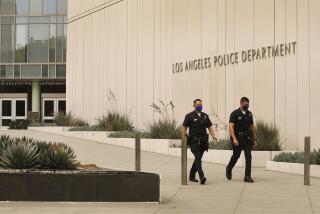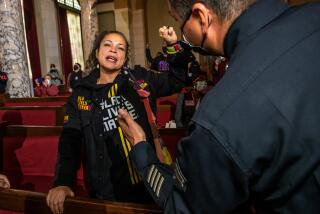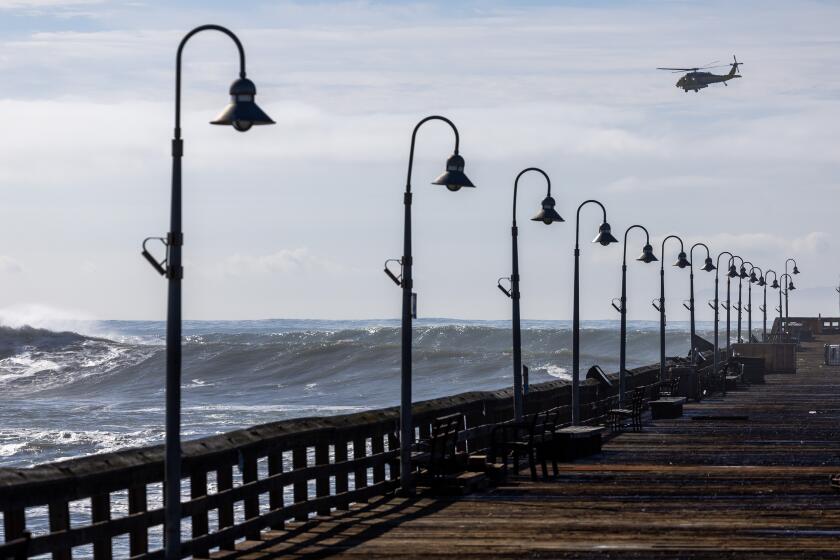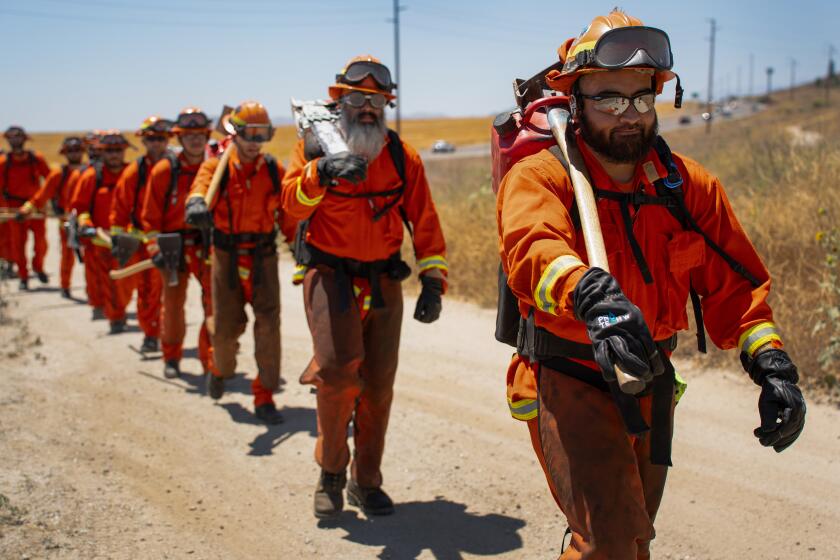Journalist seeks dismissal of lawsuit over photos of LAPD officers
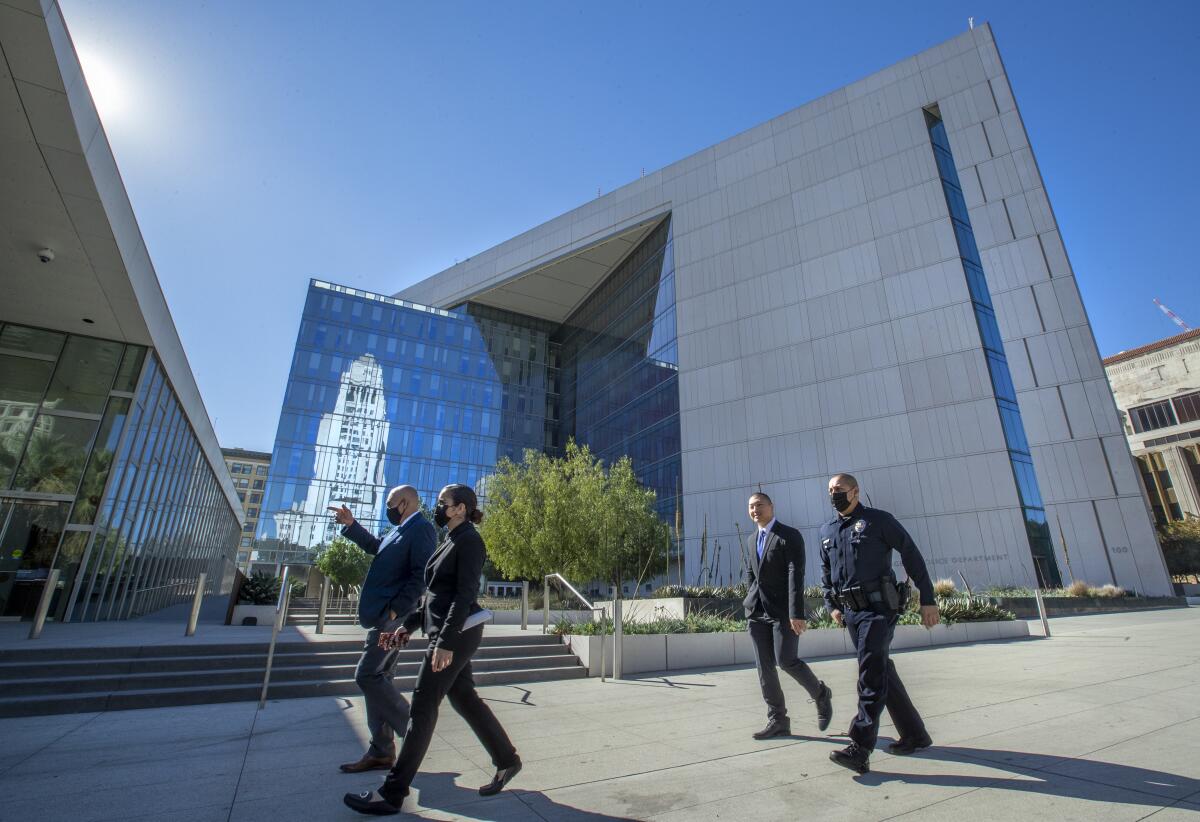
Lawyers for a journalist sued by the city of Los Angeles over his role in the publication of photographs of undercover LAPD officers are seeking to have the case dismissed as unconstitutional and retaliatory.
The legal team for Ben Camacho, a reporter for Knock LA, filed a motion this week asking a judge to toss out the lawsuit filed earlier this month, in which city officials sought the return of the photos. The motion alleges the litigation is a so-called SLAPP lawsuit — an improper lawsuit used by public officials as a way to censor or intimidate someone from exercising their free speech.
“The City of Los Angeles’ lawsuit is a thinly veiled attempt to silence Mr. Camacho and other journalists who report on law enforcement,” attorney Dan Stormer said at a news conference Tuesday. “The real motives behind this lawsuit are to shield the Los Angeles Police Department from any measure of accountability and transparency.”
Other attorneys representing Camacho include Susan Seager, head of UC Irvine School of Law’s Press Freedom Project.
In its lawsuit, attorneys for the city claim the release of names, photos and serial numbers of more than 9,000 LAPD officers in response to a public records request and related litigation by Camacho was “inadvertent.” The publication of images of those officers who serve in undercover assignments, they argued, posed a safety risk to the officers.
After receiving the photos, Camacho provided them to the Stop LAPD Spying Coalition, which published them online. The city has also sued that group.
“The City seeks the return of these inadvertently produced photos to protect the lives and work of these undercover officers,” the city’s attorneys wrote.
The city attorney’s office is also seeking to have the officers’ photos removed from the Coalition’s website.
In their motion, Camacho’s lawyers argue that the city’s attempt to undo the publication of the officers’ photos and information amounts to an infringement on Camacho’s freedom of speech. Such a ploy, they wrote, is barred by the state’s statute prohibiting SLAPP lawsuits.
Seager said a hearing is slated for Aug. 2, but she hopes the lawsuit will be dismissed sooner.
The motion notes that the city willingly gave Camacho the records six months ago to settle the lawsuit he brought under the state’s public records law and that it wrote Camacho a letter saying that the records did not include any officers working “undercover.”
The motion also states the city failed to specify what it means by an undercover assignment and that its claims of threats to officer safety are conjecture.
“Similar to other CPRA requests I’ve made in the past, I requested these records to advance my work, including documentary filmmaking and investigations into policing in Los Angeles,” said Camacho in a statement Tuesday. “Access to police records brings transparency and awareness to the otherwise secret inner workings of the LAPD, an organization that receives billions of dollars from the public.”
Both Knock LA and the Stop LAPD Spying Coalition denounced the lawsuit in separate statements. Knock LA, called it a “clear intimidation tactic” by City Atty. Hydee Feldstein Soto. The Stop LAPD Spying Coalition, a frequent critic of the LAPD’s use of surveillance technology, called it “an attack on the public’s ability to request, analyze, and publish public records.”
Legal experts uniformly rejected the lawsuit as baseless and ripe for dismissal on 1st Amendment grounds and other well-established legal protections for journalists.
“This is a Hail Mary, desperation play by the city,” said David Loy, legal director of the California First Amendment Coalition.
“The city is on very weak legal grounds,” Erwin Chemerinsky, dean of the UC Berkeley School of Law, told the Times earlier this month.
The motion is the latest twist in weeks of controversy that have followed the release of the images.
Hamid Khan, a coordinator with Stop LAPD Spying, said Camacho “shared” the officers’ images and information with his organization. The group then posted them online as part of a public, searchable database called “Watch the Watchers,” which includes each officer’s name, ethnicity, rank, date of hire, division/bureau, serial number and photo.
The union that represents rank-and-file LAPD officers subsequently sued Chief Michel Moore over the release of the photos, hoping to force the department to stop disclosing such images and try to claw back those already released. More than 300 LAPD officers who claim to work in sensitive assignments have also given notice that they intend to sue the city for negligence and for allegedly endangering their lives by releasing the images.
More to Read
Start your day right
Sign up for Essential California for news, features and recommendations from the L.A. Times and beyond in your inbox six days a week.
You may occasionally receive promotional content from the Los Angeles Times.
